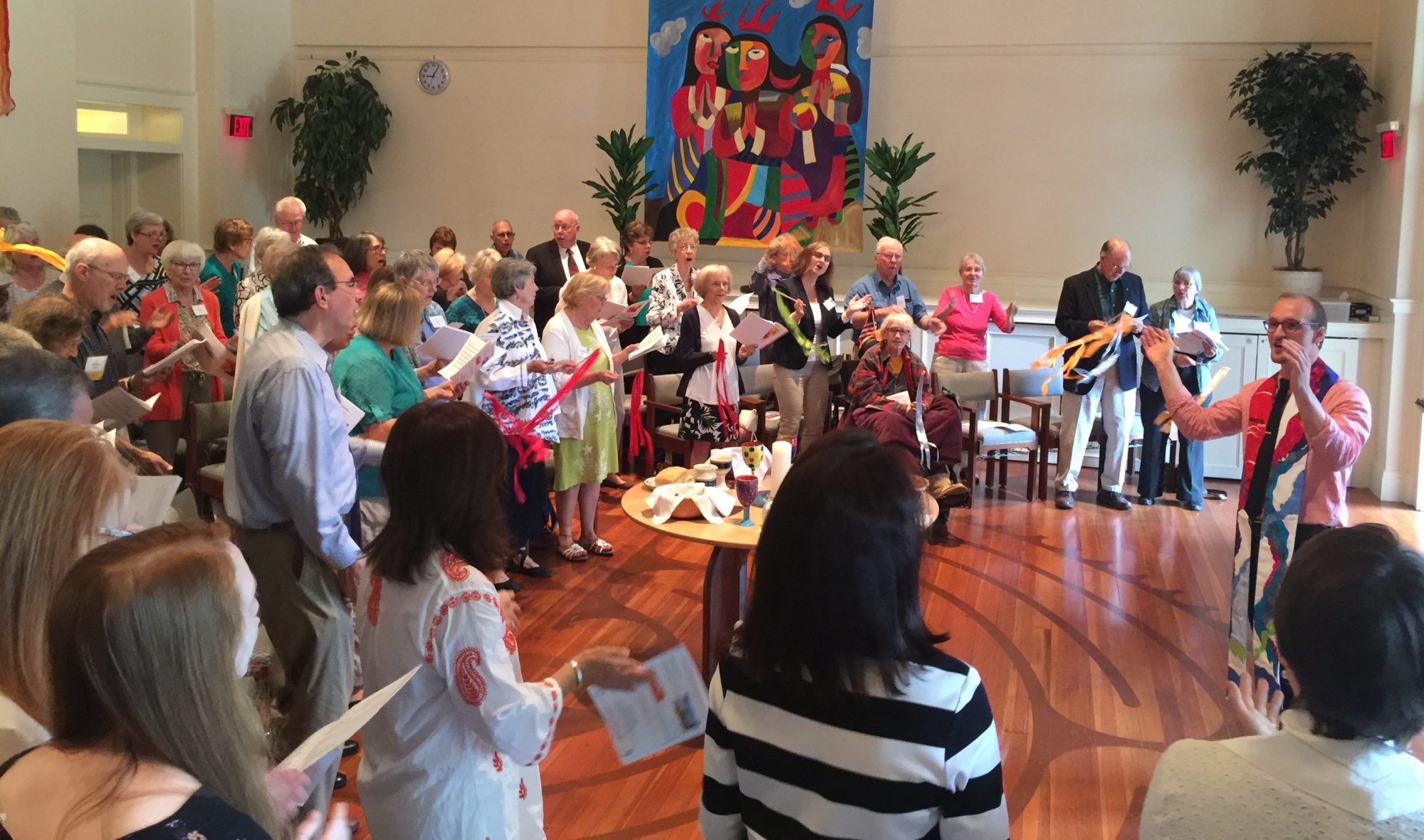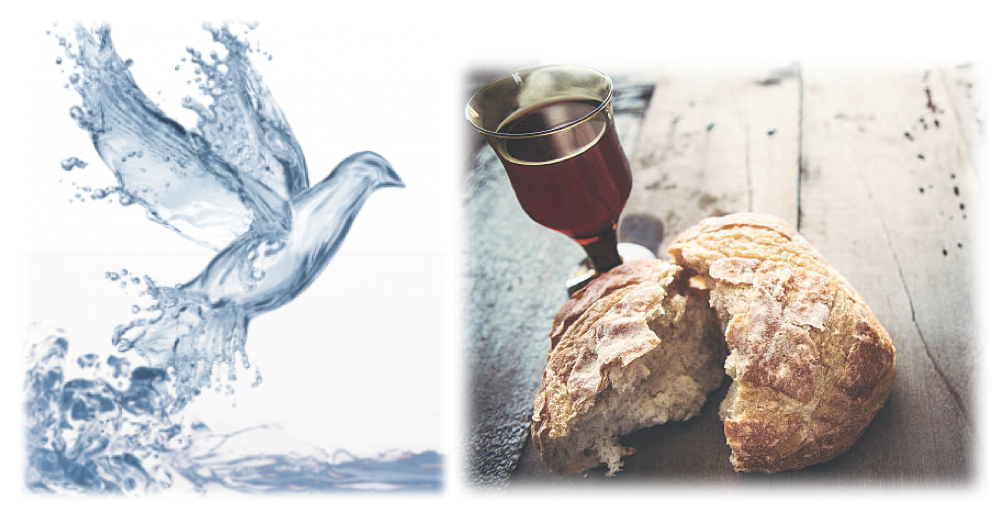Holy Communion: Healing a Broken World through a Heavenly Banquet
There is a brokenness to beauty, and beauty in brokenness—“a ‘beauty’ whose strength and power is in the fact that it avoids covering over the brokenness, the multiplicity, the fractures and the fragments.
—Dan Miller
Given the stark reality of brokenness, how do we speak about forgiveness and pursue healing in our communities and world? The most powerful image for me in responding to this question comes in the sacrament of Holy Communion. This sacrament is beautiful. I once told a seminary friend—a Unitarian Universalist inquisitive about why I love Communion so much—that I think I could write a hundred different sermons on this Heavenly Banquet. This simple meal taken with the memory of Jesus and friends in that upper room is a profound opening to the depths of gospel—gospel audacious enough to imagine a valley of dusty dead bones being filled with ruach (a biblical Hebrew word for the animating spirit and life-giving breath of God), growing sinews, and becoming enfleshed, again.
And the sacramental gift is broken. Jesus “took a loaf of bread, and when he had given thanks, he broke it and gave it to them, saying, ‘This is my body, which is given for you. Do this in remembrance of me’” (Lk. 22:19). Indeed, we take this meal remembering his spirit breaking in Gethsemane where Luke describes him sweating blood as he prays that this cup might pass; remembering his body beaten before Pilate and hung on a cross; remembering the betrayal, denial and desertion of his closest friends; remembering that at this most vulnerable moment he was stripped of his clothing and mocked; remembering the profound anguish that cried out “My God, my God, why have you forsaken me?” before bowing his head and breathing his last.
The Table of Holy Communion opens unto a superabundant multiplicity of meaning that—like liberated Hebrew slaves receiving manna from heaven while wandering in the wilderness, or Jesus facing a hungry crowd of 5,000 and feeding them all with five loaves of bread—is both paradoxical and profound. There is beauty in this broken meal, but this beauty does not cover over the very real brokenness. It is a tension that must be held: creatively, thoughtfully, gently. So, too, when we gather. I believe all are welcome to this meal. Not just the confirmed or members; not just those who can articulate a theology of it, but anyone who is curious, inspired or challenged by the life and death of Jesus and wants to know more about his invitation to new life. At that last meal with Jesus was one he knew would betray him for a small sum of money and one who would deny him three times. Indeed, the rest fled, abandoning him to the violent forces of power. When I say all are welcome to the Table, I take this biblical account as my background. And like the bread and cup, we too are invited to be transfigured.
In the winter of 2015, this simple meal’s superabundance of paradoxical and profound meaning opened up for me again. I was in my first year at Harvard Divinity School working part-time at First Church in Cambridge UCC’s men’s shelter, which houses fourteen guests. At 6pm, after setting out dinner and letting the guys in, we gathered to break bread. Some nights we sat and laughed together while watching 30 Rock, a group favorite. Other nights, we talked about everything from politics and religion to family, sports, and the daily struggles of trying to secure work or just stay warm. Private conversations often delved into personal struggles like addiction, mental health, masculinity, anger, forgiveness, and grace—struggles of faith.
One of the guys, Dan, regularly came into the staff office to talk with me—it helped him deal with the depression and indignity he felt as a result of being out of work and not having his own place (when he first arrived, Dan was working ~80 hours/week as a foreman). That night, however, I was unprepared for the conversation we were about to have. He began by recounting the time he had served in prison. For years, he said he picked cotton in boiling southern fields alongside other predominantly African American prisoners for pennies an hour—the contracted “wage” for prison labor—while wearing an orange jump suit with a large “kill shot” target printed on the front and back. White guards with guns roamed the fields on horseback monitoring their work.[1] A few nights later, Dan came in and said: “I really need to get back to church.” “Why is that?” I inquired. This time, he wanted to talk about his many sins: broken relationships, family struggles, and the ways he had hurt others. “Do you think God could ever forgive me? I’m so afraid he won’t,” he muttered through soft tears. As our conversation continued, he said that while in prison he was given a Bible. That Bible and its God became his refuge and hope in the barren land he inhabited. But finding a church was intimidating. So Dan and I decided to attend First Church in Cambridge UCC together. With him at my side, I began to hear the liturgy and its promises with new ears. It brought tears to my eyes. Several times.
Soon, simple shelter dinners were no longer merely a meal. Lasagna, salad and baked beans were transfigured into the great Heavenly Banquet and these men were the honored and dignified guests. All were transfigured indeed. This transfiguration, however, did not romanticize or cover over their broken realities. Rather, it invited me to live in the world with a renewed and reformed vision, deepened sense of interconnectedness, and resolved hope. The table of Holy Communion is broken and beautiful, indeed. And that is Good News for a beautiful but broken world.
Baptism: the Cost & Joy of Discipleship in Community
Like most of the Christian life and calling, the sacrament of baptism is not merely about the individual. Whether done as an infant or adult, through sprinkling or immersion, we are baptized unto Christ and into community. Time breaks down and eternity breaks in—saints past, present, and future join to witness and with God declare: “this is my beloved child.” This sacrament asserts God’s indiscriminate and unconditional love—which makes us as Christian as we’ll ever be—and invites us to covenant with God and the one baptized, promising to love and nurture her whether she becomes a prodigal, remains faithful, or both.
In baptism, one symbolically dies to herself and is raised anew with Christ, marking a decision—hers or her guardian’s—to enter a community striving to embody the Beloved Community and make manifest the Reign of God. That is, we enter a community of discipleship with all its joy and costliness: “If any want to become my followers, let them deny themselves and take up their cross daily and follow me. For those who want to save their life will lose it, and those who lose their life for my sake will save it” (Lk. 9:23-24). Our hope in doing so is to proclaim with Paul as both aspiration and ours now by faith that we have been crucified with Christ; it is no longer we who live, but Christ who lives in us. The life that we now live in the flesh we live by faith in the Son of God, who loved us and gave himself for us” (Gal. 2:19-20).
This notion of discipleship is crucial for me. The church is not a social club that merely gathers for good company and to form civil ladies and gentlemen who give back by donating leftovers to charities. The church is a community that, in looking to Jesus, comforts one another when they are afflicted and “afflicts” one another when they are comfortable. The Gospel of Jesus Christ is this: God loves us so much that God accepts us exactly as we are; but God loves us too much to leave us there (as my pastor has often said). In baptism, this Gospel Word becomes enfleshed in the church’s commitment to supporting its newest member in her life-long commitment to a discipleship that doesn’t merely reinforce her own views. In following Jesus, we find that he constantly breaks down our barriers of division, pushes us to deepen our understanding of God, and opens us to repentance and reformation. Jesus’ costly call to discipleship is a far cry from privatized religion. The Kingdom of God was an affront to Caesar’s status and a subversion of the values of his Empire. Then and now, the religion of Jesus is political; it is about transformation in every realm of life—public and personal. Jesus disrupts our status quo and offers his Spirit to sustain us through the anxieties wrought by change.
In Huda, a Sudanese-American and hijab-wearing Muslim woman I encountered Jesus in a way that not only inspired my own personal faith, but also asked me how that faith manifests itself on behalf of our society’s most vulnerable members. In Mike, Jesus not only challenged my understanding of what Scripture says and doesn’t say about homosexuality, but also challenged me to pay attention to how the humanity of LGBT people is denied through discrimination. In Levi, Jesus confronted me with the Church’s anti-Semitism and complicity in atrocities like the Holocaust, where many churches refused to help Jews unless they converted. Through him, Jesus impressed “Never again” upon me—not for anyone: Jews, Palestinians, Tibetans, Armenians, Native Americans, Muslims, or anyone else.* In Dan, Jesus challenged me to acknowledge my own silence and complicity in our system of mass incarceration that imprisons and disenfranchises a disproportionate number of black people—the vast majority for minor crimes we’re now making legal, like possessing marijuana. In each of these children of God, I daily encounter the mystery of the incarnation and the love of God that indiscriminatingly lavishes all. In response to this vivacious love, I hear Jesus’ perpetual invitation to affirm my baptism through his costly and joy-filled call to discipleship. This invitation bids me come and die and be born anew in Christ. It is not merely a call to be nice or a good gentleman; it is a call to nothing less than an endless journey of utter transformation. This journey is not for a select few, but for all of us. In ministry, I seek to serve others as we struggle on it together.
[1] If you are unfamiliar with this practice, I encourage you to Google some combination of the words: “prison labor;” “thirteenth amendment;” and “picking cotton.” There are a number of articles and documentaries exposing it.
* For more on these relationships, see my post: “my faith journey and call to ministry”

